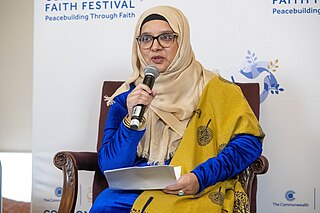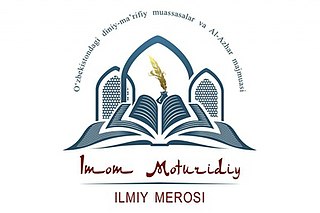Related Research Articles

The Al-Azhar University is a public university in Cairo, Egypt. Associated with Al-Azhar Al-Sharif in Islamic Cairo, it is Egypt's oldest degree-granting university and is known as one of the most prestigious universities for Islamic learning. In addition to higher education, Al-Azhar oversees a national network of schools with approximately two million students. As of 1996, over 4,000 teaching institutes in Egypt were affiliated with the university.
The Grand Mufti is the head of regional muftis, Islamic jurisconsults, of a state. The office originated in the early modern era in the Ottoman Empire and has been later adopted in a number of modern countries.

The Barelvi movement, also known as Ahl al-Sunnah wal-Jama'ah is a Sunni revivalist movement that generally adheres to the Hanafi and Shafi'i schools of jurisprudence, and Maturidi and Ash'ari schools of theology with hundreds of millions of followers, and it encompasses a variety of Sufi orders, including the Chistis, Qadiris, Suhrawardis and Naqshbandis as well as many other orders of Sufism. They consider themselves to be the continuation of Sunni Islamic orthodoxy before the rise of Salafism and the Deobandi movement.

Ahmed Raza Khan Barelvi Qadri, known reverentially as A'la Hazrat, was an Indian Islamic scholar and poet who is considered as the founder of the Barelvi movement and the Razvi branch of the Qadri Sufi order.
There is a difference of opinion among Muslims regarding the circumstances in which women may act as imams, i.e. to lead a mixed gendered congregation in salat (prayer). The orthodox position is that women cannot lead men in prayer, which is justified by various Quranic verses and Hadith about the roles and responsibilities of men and women.

Abdulaziz bin Abdullah Al-Sheikh is a Saudi Arabian scholar who is the current Grand Mufti of Saudi Arabia. As such he is head of the Council of Senior Religious Scholars and its sub-committee, the Permanent Committee for Islamic Research and Issuing Fatwas.

Zaid Shakir is an American Muslim scholar and co-founder of Zaytuna College in Berkeley, California. He teaches courses on Arabic, law, history, and Islamic spirituality.

Turan Dursun was a Turkish author and atheist who was a critic of Islam. A former Muslim cleric and scholar of Shia Islam, he became an atheist during his study of the history of monotheistic religions. Influenced by the 9th-century Iranian skeptic philosopher Ibn al-Rawandi, Dursun wrote a number of books about religion which included interpretations of Islamic texts, heavily criticizing Islam and the founders of its major branches.

The Alliance of Religions and Conservation (ARC) was a United Kingdom-based international organisation founded by Prince Philip, in 1995.
Fazlun Khalid is a Sri Lankan born British Islamic ecotheologian and the Founder-Director of the Islamic Foundation for Ecology and Environmental Science based in Birmingham, England. He has served as director of training at the Alliance of Religions and Conservation and as a consultant for World Wildlife Fund.

The Interfaith Center for Sustainable Development (ICSD), is a nonprofit organization, founded and directed by Rabbi Yonatan Neril in 2010. Based in Jerusalem, ICSD connects religion and ecology and mobilizes faith communities to act. ICSD's director has spoken at the World Economic Forum in Davos, multiple UN climate conferences, and the Parliament of World Religions.

Husna Parvin Ahmad, OBE is a Pakistan-born British humanitarian and writer. She is the CEO of Global One 2015, a women-led INGO. She is Secretary-General of the World Muslim Leadership Forum. She was the chief executive officer of the Faith Regen Foundation.

The National Muslim Council of Tanzania (BAKWATA) is a leading faith-based Islamic organisation headquartered in Kinondoni ward of Kinondoni District in Dar es Salaam Region, Tanzania.
Rizwe Mohammed is the President of All Ceylon Jamiyyathul Ulama. Since 2003, Mufti M.I.M. Rizwe has been the President of All Ceylon Jamiyyathul Ulama (ACJU), the supreme body of Islamic Theologians in Sri Lanka, inaugurated in 1924, incorporated by the Parliamentary Act No. 51 of 2000.
The Grand Mufti of Australia is a Sunni Muslim cleric, or Grand Mufti, chosen to represent and answer questions from the growing Muslim population. Nominated by the Australian National Imams Council (ANIC), the current Grand Mufti of Australia since 2018 is Ibrahim Abu Mohammed. Mohammed previously held the position from 2011–2018, and became Grand Mufti again after his successor, Abdel Aziem Al-Afifi died in office after a four-month tenure.

Yonatan Neril is an interfaith environmental advocate, NGO director, and rabbi. He is the founder and current director of the Interfaith Center for Sustainable Development (ICSD), a non-profit organization based in Jerusalem.
The 2016 conference on Sunni Islam in Grozny was convened to define the term "Ahl al-Sunnah wa al-Jama'ah", i.e. who are "the people of Sunnah and majority Muslim community", and oppose Takfiri groups. The conference was held in the Chechen Republic capital of Grozny from 25 to 27 August 2016, sponsored by the president of Chechnya, Ramzan Kadyrov, and attended by approximately 200 Muslim scholars from 30 countries, especially from Russia, Egypt, Syria, Libya, Kuwait, Sudan, Jordan, etc. at the invitation of Yemeni scholar, Ali al-Jifri.

Ahmad Zayni Dahlan (1816–1886) was the Grand Mufti of Mecca between 1871 and his death. He also held the position of Shaykh al-Islam in the Hejaz and Imam al-Haramayn. Theologically and juridically, he followed the Shafi'i school of thought.
The Islamic Declaration on Global Climate Change was a faith-based collective call of Islamic environmentalism to combat and tackle climate change addressed to Muslims all over the world. It was a result of a 2015 international symposium of representatives of academics, religious authorities, inter-governmental organisations, and civil society across a broad cross section of Muslim communities ahead of the Paris Climate Change Conference in 2015–2016.

The 2020 International Maturidi Conference was an international scientific-practical conference held over three days, from 3 to 5 March 2020, in the city of Samarkand and under the title of "Imam Abu Mansur Maturidi and the Teachings of Maturidiyya: The Past and the Present".
References
- ↑ "Scholars say Islam teaches care for the environment - The National Newspaper". thenational.ae. Archived from the original on 4 March 2016. Retrieved 10 September 2010.
- ↑ "Alliance of Religions and Conservation". bcca.org. Retrieved 10 September 2010.[ dead link ]
- 1 2 "Sustainable Ecosystems and Community News: Islam's Green Initiative". enn.com. Retrieved 10 September 2010.
- ↑ "Living on Earth: Eco-Islam". loe.org. Retrieved 10 September 2010.
- ↑ "ARC - News and Features - Historic Istanbul Declaration of the Muslim 7 Year Action Plan on Climate Change". arcworld.org. Retrieved 10 September 2010.
- ↑ "World Muslim Scholars' contribution to environment". Imam Shafi Research Forum. 14 July 2009. Retrieved 10 September 2010.
- ↑ "ARC - Faiths and ecology - Islamic eco-news". arcworld.org. Retrieved 10 September 2010.
- ↑ "International Muslim Conference on Climate Change Pressures OIC to Act". en.islamtoday.net. IslamToday - English. Archived from the original on 18 April 2010. Retrieved 10 September 2010.